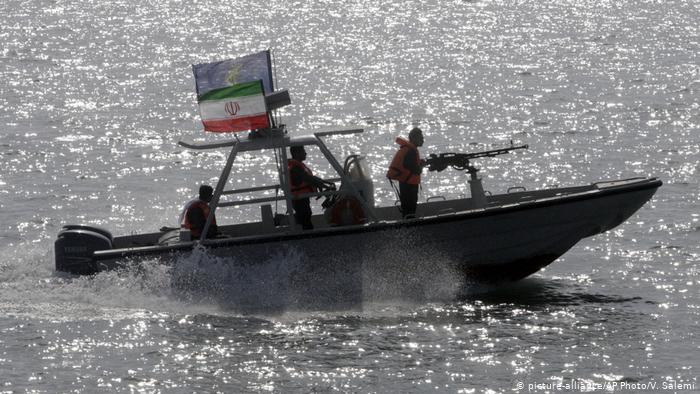Iran has seized a United Arab Emirates ship that had encroached on its territorial waters earlier this week, on the same day that UAE Coast Guards killed two Iranian fishermen, Iran's foreign ministry said on August 20.
"On August 17, an Emirati ship was seized by Iran's border guards and its crew was detained due to illegal traffic in our country's waters. The legal procedure is underway to look into the situation of the vessel," the ministry's official website reported.
The statement added that on the same day, UAE Coast Guards shot dead two Iranian fishermen and seized a boat in the Persian Gulf. Following the incident, the Iranian foreign ministry summoned the UAE charge d'affaires in Tehran and stressed that those arrested, as well as the seized fishing boats, must be released, and the bodies of those killed must be handed over to Iran.
Iran demands compensation for the damage inflicted and called on the UAE to take the necessary measures to prevent such events from happening again in the future. The Iranian boat and its crew have been released, the statement said, while the legal process of transferring the bodies of the dead is underway.
Meanwhile, UAE state news agency WAM reported on August 17 that the state’s Coast Guard had tried to stop eight fishing boats which violated its territorial waters northwest of Sir Bu Nu’Ayr island; however, the agency did not mention any casualties or seizure of a boat.
Tensions have mounted between the two Persian Gulf countries after the UAE and Iran's archrival Israel announced on August 13 that they were establishing full diplomatic relations in a US-brokered deal, which included an Israeli pledge to suspend its controversial plans to annex parts of the occupied West Bank.
On August 15, Iranian President Hassan Rouhani commented on the UAE’s move to normalize relations with Israel, saying that as a Muslim state, “the UAE has made a big mistake."
He described the UAE's move as “a clear betrayal to the Palestinian people, the cause of al-Quds and Muslims”, and said that "unfortunately, the UAE has made a big mistake and we hope it will return from this wrong path. We warn them not to invite Israel to the region, in which case they will be treated differently,” the official website of Rouhani reported.
On August 14, UAE Minister of State for Foreign Affairs Anwar Gargash said, “the UAE-Israeli peace treaty is a sovereign decision not directed at Iran. We say this and repeat it. We do not accept interference in our decisions."
Two days later, the secretary-general of the six-member Gulf Cooperation Council, Nayef Falah Al Hajraf, also denounced “threats” by Rouhani and other Iranian officials towards the UAE over the deal.
Al Hajraf called on Iran to adhere to the basic principles and fundamentals of the United Nations Charter and international law, which are based on respect for state sovereignty, non-interference in internal affairs, resolving disputes by peaceful means and not using or threatening to use force.
Iran has reportedly lent assistance to Palestinian groups such as Hamas and the Islamic Jihad which are fighting against Israel. In 2012 and 2014, Parliament Speaker Ali Larijani confirmed Iran's military support to some Palestinian groups.
The UAE contests Iran's sovereignty over two islands — Lesser and Greater Tunb — in the Persian Gulf, while Iran considers them as an inseparable part of its territory. The islands have been in Iran's control since November 1971, following the departure of British forces from the Persian Gulf and a few days before the UAE's declaration of independence in December 1971. The UAE has also disputed Iran's sovereignty over Abu Musa — an island in the Persian Gulf that, according to a 1971 memorandum of understanding, should be jointly administered with Iran for civil matters in the southern part of the island.







 Russian peacekeeping forces, deployed in the Karabakh (Garabagh) region of Azerbaijan since 2020, have commenced their withdrawal from the area.
Russian peacekeeping forces, deployed in the Karabakh (Garabagh) region of Azerbaijan since 2020, have commenced their withdrawal from the area.
 The number of evacuees from flooded areas in Kazakhstan has reached 97,852 people, including about 32,856 children since March 27.
The number of evacuees from flooded areas in Kazakhstan has reached 97,852 people, including about 32,856 children since March 27.
 The Islamic holy month of fasting, Ramadan comes to an end this week with the celebration of a joyous festival called Eid (meaning “festival” in Ar...
The Islamic holy month of fasting, Ramadan comes to an end this week with the celebration of a joyous festival called Eid (meaning “festival” in Ar...
 Azerbaijan officially unveiled the logo for the upcoming 29th session of the Conference of the Parties to the United Nations Framework Convention o...
Azerbaijan officially unveiled the logo for the upcoming 29th session of the Conference of the Parties to the United Nations Framework Convention o...



